Certifications and Standards Worldwide
Certifications & Standards
Eco Certifications and standards for plastic can vary significantly depending on the region and specific processes employed. Within this informative resource you will find insights into a range of these certifications, highlighting their importance in assessing and ensuring the biodegradability of various products and materials.

Whether you find yourself as a conscientious consumer seeking environmentally-friendly choices, a business striving to meet sustainability objectives, or a researcher delving into responsible practices, this page serves as a valuable guide through the diverse realm of biodegradability certifications and associated standards.
Explore some of the most widely recognized certifications globally and their role in environmental standards and sustainable methodologies.
ASTM D6954
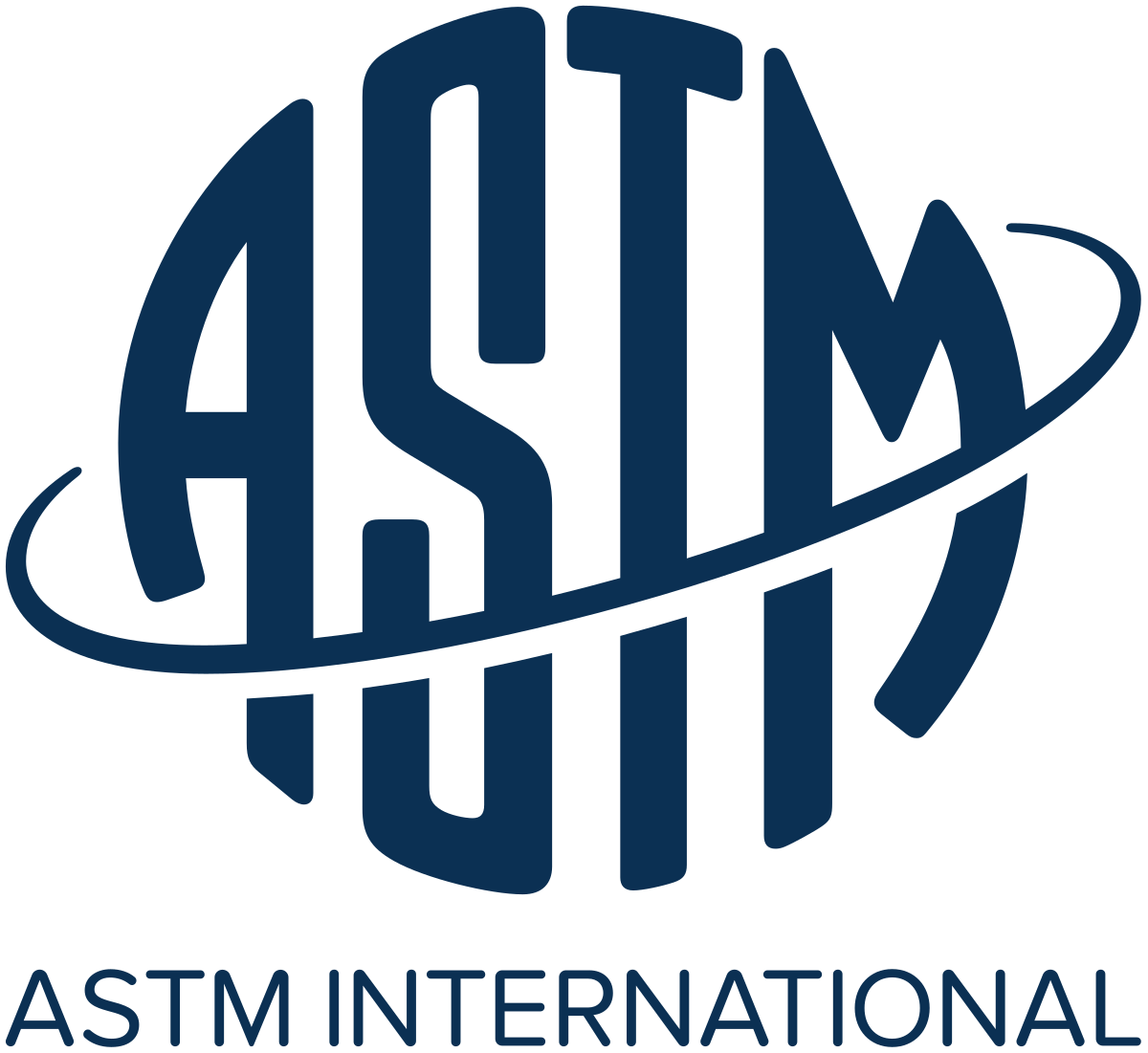
ASTM D6954 is a widely recognized standard in the United States for evaluating the biodegradability of plastics and other materials in aerobic environments. This standard is important because it helps assess the environmental impact of products, ensuring they break down efficiently. Its popularity lies in its applicability across various industries, aiding in the development of eco-friendly products and reducing plastic waste in landfills, making it an essential reference in the American market for sustainable practices.
ASTM D5988

This standard provides guidelines and procedures for conducting laboratory tests to assess the degree of biodegradation of plastics in soil over a specified period. It measures factors like the degradation of the plastic’s physical and chemical properties, as well as the formation of carbon dioxide (CO2) as an indicator of biodegradation progress. ASTM D5988 is a valuable tool for evaluating the environmental impact of plastic materials when they are disposed of in soil, helping to inform sustainable material choices and waste management practices.
ASTM D6400
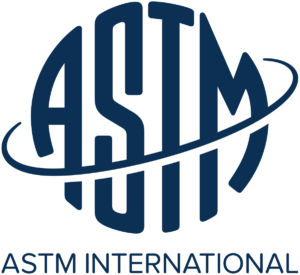
This standard outlines the criteria and procedures for assessing whether plastic materials and products are suitable for composting in industrial composting facilities. It sets specific requirements for biodegradation, disintegration, and absence of harmful substances in the resulting compost. Manufacturers and organizations seeking to certify their products as compostable often use ASTM D6400 as a benchmark to ensure their items break down effectively and safely within composting environments, reducing their environmental impact.
Australian Standard AS 4736

The Australian Standard AS 4736 is a key certification for biodegradable plastics and products in Australia. It is vital for ensuring that products meet specific criteria for biodegradability, compostability, and environmental safety. Its importance lies in setting clear guidelines for manufacturers and consumers, guaranteeing that products labeled as biodegradable adhere to rigorous Australian standards. AS 4736 has gained popularity because it empowers consumers to make eco-conscious choices and fosters responsible consumption, contributing to reduced environmental impact in Australia’s market for biodegradable products.
DIN EN 13432
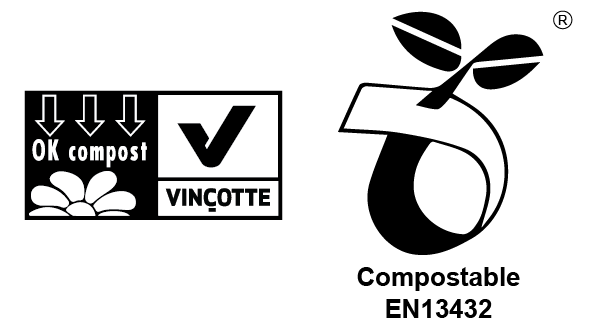
DIN EN 13432 is a European standard that focuses on assessing the compostability of packaging materials and products. Developed by the European Committee for Standardization (CEN), it outlines the criteria and testing methods for determining whether packaging materials are suitable for composting in industrial composting facilities. DIN EN 13432 sets specific requirements for biodegradability, disintegration, and absence of harmful substances in the resulting compost. This standard is widely used in Europe and is essential for manufacturers and organizations looking to certify their products as compostable, helping to reduce the environmental impact of packaging materials and promote sustainable waste management practices in the European Union and other regions that adopt these criteria.
DIN EN 14995

DIN EN 14045 primarily focuses on assessing the biodegradability of plastics in the marine environment, and it is more oriented toward industrial and commercial products rather than household products. This standard is designed to evaluate how plastics break down in seawater conditions, specifically in marine environments. It is particularly relevant for industries that produce plastic materials or products that may come into contact with marine ecosystems, such as items used in offshore operations, fishing gear, and other applications that involve exposure to seawater.
ISO 17088

ISO 18606

ISO 18606 is an international standard that defines the requirements for packaging that is suitable for organic recycling. Organic recycling, also known as composting, is a process that converts organic waste into a nutrient-rich material that can be used to improve soil fertility.
TUV OK Compost HOME
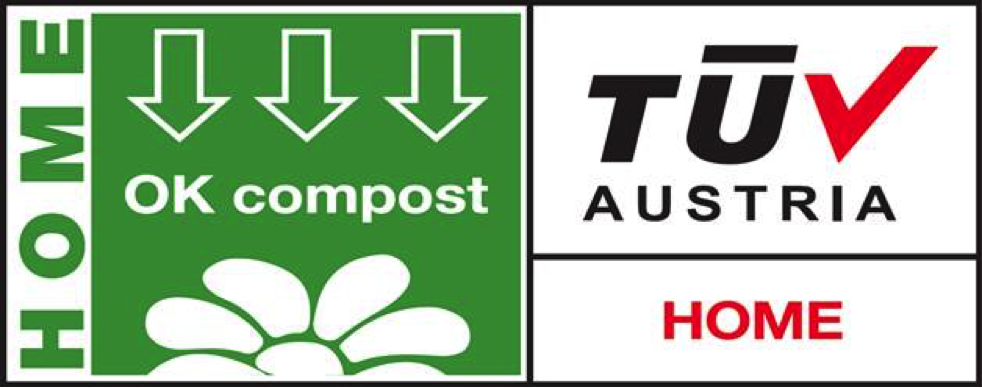
The “OK compost HOME” logo is a certification symbol used to indicate that a product is certified as compostable under home composting conditions. This certification is provided by TÜV Austria, an internationally recognized certification body. When you see the “OK compost HOME” logo on a product, it signifies that the product is designed to break down in a typical backyard composting system, meeting specific criteria for biodegradation and disintegration in home composting environments. This logo is particularly relevant for consumer products, such as compostable bags and foodservice items, that are intended to be disposed of in home compost bins or piles, offering a sustainable disposal option for consumers.
TUV OK Compost
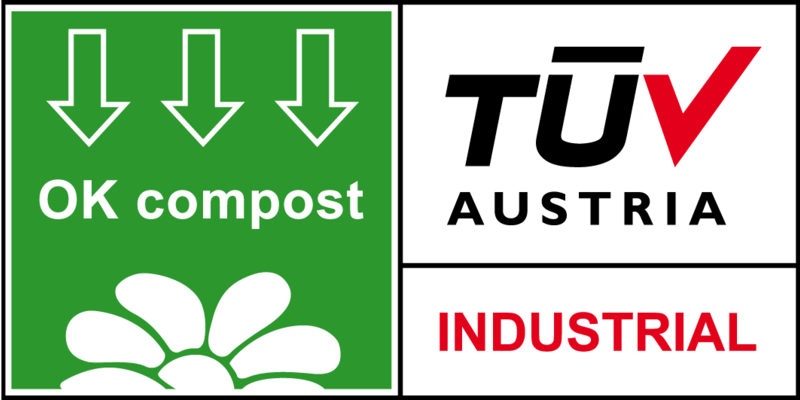
The “TÜV OK Compost” certification is provided by TÜV Austria, an internationally recognized certification body. This certification focuses on assessing the compostability of products in industrial composting facilities. When you see the “TÜV OK Compost” logo on a product, it signifies that the product is certified to break down effectively in industrial composting environments and meets specific criteria for biodegradation, disintegration, and the absence of harmful substances.


